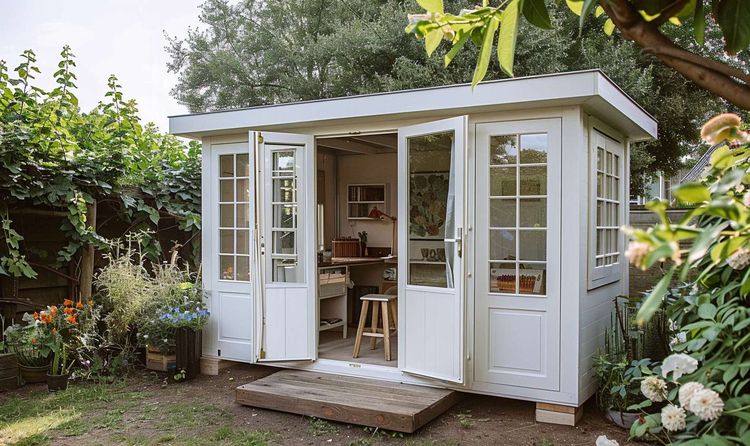Garden Office Solutions in the UK: Practical Ideas for Modern Workspaces
Designing a garden office in the UK has become a practical way to combine the comfort of home with the focus of a dedicated workspace. This article explores how garden offices improve productivity, outline key design features, and highlight considerations such as insulation, lighting, and planning permission to help you understand what makes them a functional and lasting choice.

How do garden offices create focus away from the home?
Garden offices offer a physical separation from the main house, helping to establish a clear boundary between work and personal life. This separation can significantly enhance focus and productivity by minimising household distractions. The act of “commuting” to a separate structure in the garden can also help create a mental shift, signalling the start and end of the workday. Additionally, having a dedicated workspace outside the home can make it easier to maintain a professional atmosphere during video calls or virtual meetings.
What UK rules may require planning approval for garden offices?
While many garden offices can be built under permitted development rights, certain circumstances may require planning permission. Generally, structures that are less than 2.5 meters high at the eaves and do not cover more than half the garden area can be built without planning permission. However, factors such as the building’s size, location, and intended use can affect whether approval is needed. For example, if the office will be used by non-residents or for business purposes that involve frequent client visits, planning permission may be required. It’s advisable to check with local authorities or consult a planning expert before proceeding with construction.
How does insulation keep the space comfortable year-round?
Proper insulation is crucial for maintaining a comfortable temperature in a garden office throughout the year. High-quality insulation materials, such as mineral wool or foam boards, can be installed in walls, floors, and roofs to regulate internal temperatures. This helps keep the space warm in winter and cool in summer, reducing the need for excessive heating or cooling. Additionally, double-glazed windows and well-sealed doors contribute to the overall insulation, preventing drafts and heat loss. Some garden offices also incorporate underfloor heating or air conditioning systems for additional climate control, ensuring a comfortable working environment regardless of external weather conditions.
Why is natural light important for a healthy work setting?
Natural light plays a vital role in creating a healthy and productive work environment. Garden offices often feature large windows or skylights to maximise daylight exposure, which can have numerous benefits for occupants. Adequate natural light has been shown to improve mood, reduce eye strain, and enhance overall well-being. It can also help regulate the body’s circadian rhythm, potentially leading to better sleep patterns and increased daytime alertness. Furthermore, relying on natural light during daylight hours can reduce the need for artificial lighting, potentially lowering energy consumption and associated costs.
How can a garden office add long-term property value?
Investing in a well-designed and constructed garden office can potentially increase a property’s overall value. These structures offer additional usable space, which is often attractive to potential buyers, especially in an era where remote work is becoming increasingly common. A high-quality garden office can be marketed as a versatile space that could serve various purposes, such as a home office, studio, or guest accommodation. However, it’s important to note that the actual impact on property value can vary depending on factors such as the quality of construction, the local real estate market, and how well the office integrates with the existing property.
What are some practical garden office solutions available in the UK?
Garden office solutions in the UK range from pre-fabricated structures to bespoke designs tailored to individual needs. Some popular options include:
| Provider | Type of Solution | Key Features |
|---|---|---|
| Green Retreats | Customizable garden rooms | Fully insulated, various sizes, optional extras |
| Smart Garden Offices | Modular garden offices | Thermal efficiency, quick installation, multiple designs |
| Garden Affairs | Bespoke timber buildings | Traditional and contemporary styles, planning support |
| Ark Design/Build | Architect-designed offices | Tailored to specific requirements, high-end finishes |
| Dunster House | DIY garden office kits | Cost-effective, self-assembly options, various sizes |
When considering garden office solutions, it’s essential to evaluate factors such as budget, available space, and specific work requirements. Some providers offer turn-key solutions that include everything from design to installation, while others provide more flexibility for customization or self-assembly. It’s advisable to research multiple options and request quotes from different providers to find the most suitable solution for individual needs and circumstances.
In conclusion, garden offices offer a practical and attractive solution for creating dedicated workspaces in the UK. By providing a focused environment away from the main house, adhering to local regulations, ensuring proper insulation, maximizing natural light, and potentially adding property value, these structures can significantly enhance the work-from-home experience. As the trend towards remote work continues, garden offices are likely to remain a popular choice for those seeking to optimize their home working arrangements.




